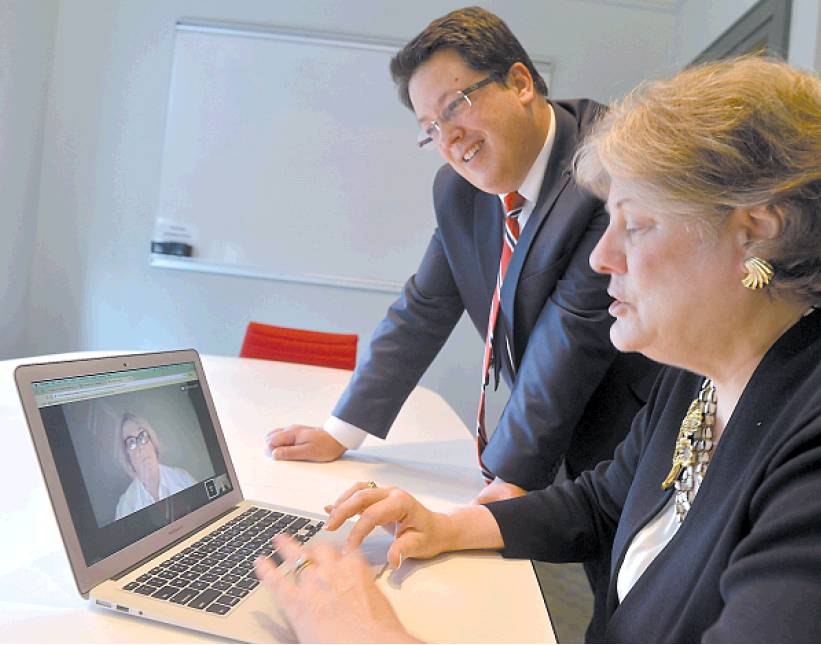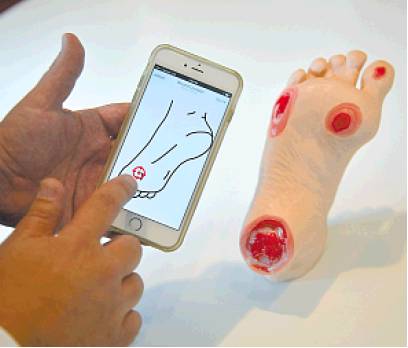For treatment model, point, click, tap, save
Savannah-based entrepreneurs use iPads, iPhones to expedite chronic wound care
by Eva FEddErly For the Savannah Morning News
A company in Savannah is seeking to change the way the health care industry handles chronic wound care.
Local health care veterans Katherine Piette and Joseph Ebberwein founded Corstrata one year ago in order to provide a new model to treat chronic wounds, which they say is more efficient and cost effective.
“Right now, the wound care system is insufficient and ineffective. Only 0.2 percent of nurses are certified in wound care. And patients have to go in person to a clinic or hospital to get treated,” Piette explained. “There’s a huge national problem with wounds. It’s a $33 billion market in terms of spending. And yet, a lot of wounds can be prevented.”
Piette and Ebberwein both worked for decades in home health, hospice, and most recently skilled nursing facilities. Between the two, they have expertise in quality management, operations, finance, and technology. Together they noticed there was a shortage in chronic wound care and expertise in the United States.
“We founded Corstrata in 2015 to provide remote wound care services by nurses who are veterans in the field and certified in wound care,” Piette said.
“Every 15 seconds a leg is amputated because of diabetes. We can help both prevent that and manage that. And the cost of amputation is high. The likelihood of getting a second limb amputated is very high,” added Ebberwein. “Other chronic wounds can precipitate serious complications. For instance, Christopher Reeve died from complications in pressure ulcers, despite amazing care.”
Corstrata matches wound care expertise with telemedicine.
“We can do telemedicine on an iPhone or an iPad. This is very important to our business model because it’s very affordable,” explained Ebberwein.
Ebber wein and Piet te created Corstrata to deliver a remote, comprehensive wound care management program and wound patient consultations. Corstrata provides specific services, such as program, policy and procedure assessment, formulary design, treatment guidelines assessment, wound documentation review, and practitioner education.
Wound program development is available for pressure ulcer prevention and management, diabetes foot ulcer prevention and management, ostomy care and management, and palliative wound management.
“ We ’v e a ss em bl e d a national team of clinicians and advisers that is recognized in the wound care space,” Piette said. “We have nurses, a physician, a physical therapist, and as such, they’re able to help us deliver the most up-to-date, most clinically validated treatments. Our remote patient monitoring app allows for patients and caregivers to monitor certain conditions which indicate potential decline in the condition of the wound such as signs and symptoms of infection or impending ulceration.”
Corstrata recruits seasoned nurses who have worked in the field for decades who are experts certified in wound care.
“Working at Corstrata allows our nurses, who have been working in hospitals on their feet for a long time, to work from home. It’s a good model for them as well, and provides them with a good opportunity to continue to educate other clinicians and patients,” said Ebberwein.
Corstrata’s clients include providers such as nursing homes, home health agencies, hospices, direct care physicians, large companies that are self-insured (Corstrata works through the third-party administrators, and directly with patients).
The company’s arsenal of wound supplies, what the founders call their “formulary,” suggests more efficacious and cost-effective treatments. “We recommend treatments that are better and more cost effective. Many times, these newer treatments can shorten the length of time for wounds to heal,” said Piette.
T he r e a re t wo w ay s Costrata connects a patient to a nurse who will consult about the wound. The program allows either an image be taken of the wound and the nurse working remotely will consult on the image. Or Corstrata can use a live video. The Corstrata program is HIPPA compliant.
A zalealand, a f ive-star skilled nursing home in Savannah, is one of Corstrata’s clients. Debbie Orne, Azalealand’s owner, said, “Corstrata is opening the door to rural facilities that do not have the resources available locally such as wound care physicians or clinics. This will enable rural facilities to deliver quality wound care without having to transport their residents to clinics far away.”
“We have nurses based in Georgia, Texas, South Carolina, and Louisiana. Our goal is to expand nationwide,” said Piette.
This month, Corstrata kicked off its newest effort in the Northeast.
The company will be particularly helpful to veterans, people based in rural areas, and Native Americans who have a high incidence of Diabetes, Piette said.
“From a business standpoint, we’re collecting a lot of data which will be key to help predict better treatments,” said Piette. “The future in health care is being able to collect data about treatment and patient outcomes to direct what kind of treatment we have in the future.”
“We’re steadily working on growing our network,” Ebberwein added. “Corstrata’s model is scalable. Ultimately, we hope to take Corstrata globally.
“The future in health care is being able to collect data about treatment and patient outcomes to direct what kind of treatment we have in the future.”
Katherine Piette



